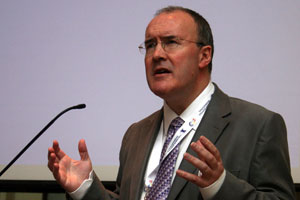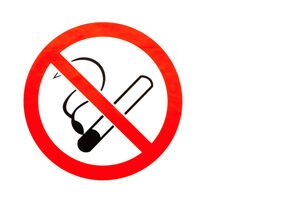A new report says Scotland must break its ‘addiction to big government and creeping prohibition’.
Published by the smokers’ group Forest, The McNanny State argues that since devolution in 1999 Scotland has become a ‘puritan’s playpen’ with politicians repeatedly intervening in the lives of ordinary people.
Highlighting the smoking ban, minimum pricing of alcohol and the named person scheme as examples of the McNanny state, the report attacks what it calls the ‘politics of intervention’.
“Public health officials moralise on our lifestyles with edicts based more on superstition than hard evidence,” said the author of the report, former member of the Scottish Parliament, Brian Monteith. “They make outrageous claims based on disreputable science that on investigation are often found to be baseless.
“With smoking and alcohol under the cosh the next big thing is going to be controlling what we eat. Portion sizes, calorie levels, and promotions that save money for those least well off will all be attacked.
“Scotland must break its addiction to big government and creeping prohibition. The country has become a puritan’s playground and it is going to get a lot worse before enough people wake up to the McNanny State and do something about it.”
The report features a foreword by journalist and novelist Allan Massie who wrote that ever since the Scottish Parliament came into being in 1999, politicians had chipped away at the liberties of the people.
“The Scottish state today treats adults as people incapable of managing their own lives and, if they are parents, as people who cannot be trusted with the unfettered care of their children,” Massie said.
“We are now in the grip of a political class that is complacently certain of its moral or ethical superiority, a class that in its ineffable conceit has no doubt that it knows what is good for us, and does not hesitate to legislate accordingly.”
Simon Clark (pictured), director of Forest, described the report as hugely topical. “The Scottish Government’s new tobacco control plan, announced last week [June 20], is another blow for those who want less not more state interference in their daily lives,” he said.
“Proposals to ban smoking in social housing and restrict the number of shops that sell tobacco represent further attacks on consumers and convenience stores that are already over-regulated to the point that they are struggling to stay in business.
“The aim of this report is to launch a national debate on the role of government in people’s lives and examine the way the issue is being addressed in political and media circles.
“Our goal is to put lifestyle choices back into the hands of consumers, not politicians and state-funded pressure groups.”
Tag: Scotland

Addicted to Big Government

Let's not rush anything
Ministers have unveiled a new action plan to help Scotland meet the target of having a ‘tobacco-free’ generation by 2034, according to an STV story.
The Scottish Government’s updated plan reportedly contains 44 measures aimed at addressing health inequalities and cutting smoking rates.
It includes plans to ban smoking around hospital buildings and implement the ban on possessing tobacco in prisons.
It also outlines media campaigns around discouraging smoking in school grounds and communal stairwells, and preventing young people from taking up the habit.
Professor Linda Bauld, Cancer Research UK’s prevention expert based at the University of Stirling, said the “much-needed” plan would save lives.
“The renewed commitment in this plan to work towards a smoke-free Scotland by 2034 is welcome,” she said.
“However, if the goal of helping people to stop smoking through the new Quit Your Way service is to be truly effective, levels of investment must be maintained.
“We know that stop smoking services are the most effective way to help people quit. Smokers are around three times more likely to quit if they use these services.”
Policies out of touch
Most Scots think government policies aimed at reducing smoking rates have gone too far or far enough, according to the results of a new poll.
A majority would allow smoking rooms in pubs and clubs, and permit designated smoking areas in prisons and hospital grounds.
An overwhelming majority think smoking should be allowed in the home and in private vehicles.
The public also believes the Scottish Government has more pressing concerns than tackling smoking.
The poll of 1,021 adults in Scotland was carried out by Populus for the smokers’ group Forest ahead of the announcement of the Scottish Government’s new tobacco control plan which is expected later this month.
Key findings of the poll were:- 54 percent of people think Government policies to reduce smoking rates have gone too far or far enough; 37 percent think they have not gone far enough; and nine percent are undecided.
- (12 years after smoking was banned in every pub and club in Scotland) 57 percent of people think pubs and private members’ clubs, including working men’s clubs, should be allowed to provide a well-ventilated designated smoking room, while 16 percent are opposed to the idea and 27 percent are undecided.
- (With regard to the Scottish Government’s zero tolerance policy on smoking in prisons) 66 percent of people agree that prisoners should be allowed to smoke in designated smoking areas.
- (With regard to the Scottish Government’s zero tolerance policy on smoking in hospital grounds) 56 percent of people and 82 percent of frequent smokers believe that National Health Service (NHS) hospital trusts should be allowed to provide designated smoking areas in hospital grounds for patients, visitors and staff.
- (Following calls to extend smoking bans to social housing, all private vehicles and some public parks) 86 percent of people think smoking should be permitted in the home; 74 percent think smoking should be permitted when smokers are alone in their own vehicle; and 55 percent think smoking should be allowed in outdoor public parks.
- (Smoking on stage and film and TV sets is allowed in England but not in Scotland where it was outlawed in 2006) 61 percent of respondents believe that actors should be allowed to smoke on stage in Scotland when smoking is integral to the plot or characterisation, while 34 percent are opposed to the idea.
Meanwhile, Scots believe the Scottish Government has more pressing concerns than tackling smoking. Asked to consider a list of 10 priorities for the NHS in Scotland, respondents said investing in new doctors and nurses is the most important priority and tackling smoking is the least important priority.
When it comes to local government priorities in Scotland, tackling smoking was again considered the least important priority, with maintenance of roads and bridges considered the most important.
Other findings were:- 44 percent of Scots think that tobacco taxation (which is responsible for between 80 and 90 percent of the price of a pack of cigarettes) is too high, 41 percent think it is about right and 15 percent think it is too low.
- 61 percent of respondents agreed that existing measures to reduce smoking rates should be subject to a full and independent review to consider their impact on consumers, retailers and public health before the Scottish Government proceeds with further measures to reduce the sale and consumption of tobacco products.
- 34 percent think smokers are treated unfairly by the Government, 28 percent believe they are treated fairly, and 38 percent believe they are treated neither fairly nor unfairly.
- 73 percent of regular smokers polled believe smokers are treated unfairly by the Government.
Urging the Scottish Government to “abandon its war on smokers”, Forest director Simon Clark (pictured) said the Scottish political establishment was clearly out of step with the public who supported fair and reasonable restrictions on where people could smoke, not prohibition.
“Any further regulations to tackle smoking would be a distraction from other more important issues facing central and local government in Scotland,” he said.
“The Scottish Government should listen to public opinion, abandon its war on smokers and focus on education not legislation.”
Meaty enterprise
A retail butcher who was caught stocking and selling more than 13,000 counterfeit cigarettes at his shop in Greenock, Scotland, was raided three times in two months, according to an exclusive story by David Goodwin for the Greenock Telegraph.
The 71-year-old Adam Johnstone-Smith was said to have hidden part of his cigarette stock in a vat of sausage spice mix in a possible bid to throw sniffer dogs off the scent.
Johnstone-Smith – who had 13,360 counterfeit cigarettes seized – said he’d resorted to the illegal side-line because his business was in “dire straits”.
But a sheriff said that Johnstone-Smith “must have made significant money” from dealing in the inferior-quality tobacco.
HM Revenue and Customs and Trading Standards teams visited the shop on June 16 last year and confiscated 8,400 cigarettes and 1.7 kg of hand-rolling tobacco.
The shop was searched again on July 7 and 4,300 cigarettes were seized.
A third visit with dogs on August 17 yielded yet more cigarettes and packs of hand-rolling tobacco concealed within a plastic bin containing the spice mix.
Johnstone-Smith pleaded guilty to being knowingly concerned in carrying, harbouring, concealing or in any other manner dealing goods which were chargeable with duty and did this with intent to ‘defraud Her Majesty’ of £4,548.
The court heard that he had paid the duty prior to his sentencing hearing.
Smith was ordered to complete 150 hours of unpaid work within six months as an alternative to prison.
An HMRC spokesman was quoted as saying that the sale of illicit tobacco would not be tolerated.
“Disrupting criminal trade is at the heart of our strategy to clampdown on the illicit tobacco market, which costs the UK around £2.5 billion a year,” he said.
“This is stealing from the taxpayer and undermines legitimate traders.”
The full story is at: http://www.greenocktelegraph.co.uk/news/16161444.Butcher_caught_in_fake_cigarettes_raid_hid_goods_in_sausage_mix/
Jigsaws for prisoners
A report in the Scottish Sun describing how prisoners in Scottish jails could be given jigsaws and colouring books to wean them off cigarettes has been met with incredulity.
“Smoking is one of the few pleasures many prisoners enjoy,” said Simon Clark, director of the smokers’ group Forest.
“That’s why tobacco is an important currency in prison.
“It’s laughable to think you can replace it with jigsaws or colouring books.
“Smoking is not a right but if inmates wish to smoke there should be areas where they can light up without the long arm of the nanny state denying them that small comfort.
“If, on the other hand, the plan is to treat them like children, don’t be surprised if they behave like children.”
Minimum pricing mooted
Setting a minimum price for tobacco products could be used as part of a campaign to reduce the number of smokers in Scotland, according to a BBC Online story.
The proposal was made after the Scottish government announced it would introduce minimum alcohol pricing from next May.
Public health experts in Scotland are suggesting, too, that raising the price of tobacco products and reducing their availability, in part by incentivising retailers not to sell them, might help tackle health inequalities.
NHS [National Health Service] Health Scotland and the Scottish Collaboration for Public Health Research and Policy (SCPHRP) at the University of Edinburgh have put forward these and other ideas as part of a new national tobacco strategy.
They want to see also mass media campaigns to encourage smokers to stop, and to reduce exposure to second-hand smoke.
They recommend that effective policy actions should focus on reducing health inequalities.
Twenty-one percent of adults in Scotland smoke, down from 28 percent in 2003.
However, adult smoking levels have been static since 2013.
And rates are still highest in the financially poorer areas of the country, with 35 percent of adults in the least well-off areas smoking compared to 10 percent in the most well-off areas.
Dr. Garth Reid, principal public health adviser at NHS Health Scotland and one of the study’s authors, said Scotland’s health was improving but that the gap between the health of the best and least well-off was widening.
NHS Scotland claims that smoking causes more than 10,000 deaths a year.

Warning: grandparents
Grandparents – or, presumably, some grandparents – are a potential health hazard for children and may increase their risk of cancer, according to a story in the Irish Independent citing a new survey.
Some grandparents are said to spoil their grandchildren with sweet treats and big helpings of fattening food, and expose their lungs to second-hand tobacco smoke.
These claims are based on a review of research into the influence grandparents have on lifestyle factors that can sow the seeds of cancer in later life.
Lead author Dr. Stephanie Chambers, of the University of Glasgow’s Public Health Sciences Unit (Scotland), said that while the results of the review showed that behaviour such as smoking and regularly treating increased cancer risks as children grew into adulthood, it showed too that these risks were indulged unintentional.
“Currently grandparents are not the focus of public health messaging targeted at parents and in light of the evidence from this study, perhaps this is something that needs to change given the prominent role grandparents play in the lives of children,” said Chambers.
The researchers said that previous research had looked at the way parents could affect their children’s susceptibility to cancer and other diseases, but less attention had been paid to the role of part-time carers such as grandparents.
The Glasgow team analysed data from 56 studies undertaken in 18 countries.
Overall, grandparents were found to have an adverse effect – despite meaning well. In many cases, such as rewarding good behaviour with sweets, they were putting the health of their grandchildren at risk with kindness.

Vaping blasts bugs
A study by scientists based in Glasgow, Scotland, suggests that one of the chemicals in e-liquids kills off bugs that make people ill, according to a story by Mark Howarth for the Sunday Post.
A report of the study published in the journal Medical Hypotheses suggests that breathing in the fumes of propylene glycol could help destroy even long-term infections.
The new research describes the case of a woman who had suffered tonsillitis for nine years and whose symptoms vanished within weeks of taking up vaping.
The 26-year-old computer scientist, who had never smoked, had come to accept there was no medical treatment for her condition and had stopped seeking help.
She took up vaping when her partner quit smoking for e-cigarettes and, within about three months, realized that her symptoms had disappeared.
‘She has now been vaping for eight months and her tonsillitis has not recurred,’ the report says. ‘She has not suffered a single respiratory infection or common cold.’
“As this is a never-smoker, the improvements cannot be attributed to smoking cessation,” said lead author Dr. Joanna Astrid Miler, of the Glasgow-based Centre for Substance Use Research. “One possible explanation is that the improvement was due to antimicrobial properties of propylene glycol.
“A trial of vaping zero-nicotine e-cigarettes in patients with recurrent throat infections could clarify whether this is an effect that could benefit others.”
Previous research has found that propylene glycol, which is a synthetic compound of carbon, hydrogen and oxygen, is effective in tackling bacteria linked to the onset of colds and sore throats, such as Streptococcus and Staphylococcus.
The latest study was produced in conjunction with Queen Mary University, London.
The full story is at: https://www.sundaypost.com/fp/holy-e-smoke-experts-say-vaping-can-help-cure-sore-throats/

Antis nose around homes
Anti-tobacco campaigners in Scotland are pushing for new measures that could prevent smokers from lighting up at home, according to a story by Colin McNeill for the Herald Scotland.
ASH Scotland wants to hold talks with social housing providers to explore ways of introducing no-smoking rules for some tenants.
It wants to look also at how legislation surrounding smoking in residential care homes could be tightened to protect staff from passive smoking.
The move has been boosted by a call from Aberdeen University academic Dr. Sean Semple for a national debate around smoking at home.
“We need to have a debate on why we currently think it acceptable to expose non-smokers, including children, to second-hand tobacco smoke within indoor spaces,” he said. “That debate needs to include smoking in the home.”
However, the smokers’ group Forest was said to have branded any attempt to stop people from smoking in a home setting as “obnoxious”, adding that it would constitute a gross invasion of privacy and be almost impossible to enforce.
“Targeting social housing is particularly obnoxious because it penalises unfairly those who can’t afford to buy their own home,” Forest director Simon Clark was quoted as saying. “Prohibiting smoking at home would be almost impossible to enforce but it could create a snooper’s charter encouraging people to snitch on neighbours they don’t like.
“What happens if someone is caught and prosecuted? The consequences, including possible eviction, are out of all proportion to the alleged offence.”
Meanwhile, a Japan Times story on Monday reported how a by-law aimed at protecting children from passive smoking – including in private places such as their homes – had been enacted by the Tokyo Metropolitan Assembly.
What was said to be the first prefecture-level measure of its kind calls on people not to smoke inside rooms or vehicles in which children under 18 are present.
The by-law, which carries no penalties, calls on Tokyoites to try to ensure that children are not subjected to passive smoking anywhere. It calls on parents not to smoke in rooms where children are present.

Clearing the smoke
Vaping electronic cigarettes is definitely less harmful than is smoking tobacco, health bodies in Scotland have stated for the first time, according to a bbc.co story.
NHS [National Health Service] Health Scotland said it wanted to ‘clarify’ confusion around the harms and benefits of vaping devices.
More than 20 organizations have signed up to the consensus, which was led by NHS Health Scotland.
Health chiefs said, however, that using e-cigarettes while still smoking did not provide any health benefits.
The consensus statement, published by Scotland’s national health education and promotion agency, was agreed by the Scottish government, health boards, academia and charities such as the British Lung Foundation and Cancer Research UK.
There are estimated to be about 2.9 million people in the UK who use e-cigarettes, and more than half of them have given up smoking tobacco, a recent study has suggested.
However, despite the rise in e-cigarette use since 2012, about nine million people still smoke in the UK.
The full story is at: http://www.bbc.co.uk/news/uk-scotland-41333537.







